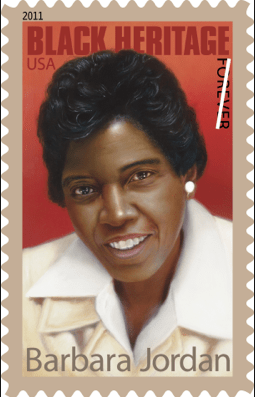“There was simply something about her that made you proud to be a part of the country that produced her.” [Former Texas governor Ann Richards]
Barbara Jordan was the first African American woman to address the Democratic National Convention, but she started on the path to this accomplishment early. In high school she was an award-winning debater and continued excelling as an orator in college, graduating magna cum laude.
After three tries (and some re-districting in Texas), Barbara Jordan was elected to the Texas state legislature, the first African American woman to serve since Reconstruction. She was not warmly received but, only six years later, her colleagues voted her president pro tempore of the state senate.
She ran for Congress and, in 1972 became the first woman to represent Texas in the House of Representatives in her own right. Along with Andrew Young, she was one of the first two African Americans elected to the U.S. Congress since Reconstruction.
At both the state and the national level Jordan supported legislative measures to assist the poor and disadvantaged. She also worked to promote women’s rights, supporting the Equal Rights Amendment and co-sponsoring a bill to allow Social Security benefits to housewives based on their labors in the home. She achieved national attention during the Watergate hearings when she eloquently defended her decision to support the impeachment of President Nixon as a means to preserve the Constitution.
Many said that she was destined for greater things but she retired from congress after being diagnosed with multiple sclerosis, and the second time she addressed the Democratic National Convention, twenty years after her first appearance, it was from a wheelchair.
In the intervening years she held a number of positions including special counsel on ethics for Texas Governor Ann Richards and she received the Presidential Medal of Freedom from President Bill Clinton.
Barbara Jordan had wanted to attend the University of Texas but the school was segregated at the time. In order to avoid integration, Texas established the all-black Texas Southern University, which Jordan attended. When she retired from Congress she was awarded a professorship to teach political ethics at the University of Texas at Austin in the Lyndon Johnson School of Public Affairs. She had also wanted to attend law school at Harvard but was advised that a black woman would not be admitted, so applied to Boston University. Harvard later established the Barbara Jordan Award for Women’s Leadership.
Her last First Woman To. .occurred after her death in 1996. Barbara Jordan was the first African American buried in the Texas State Cemetery among governors, senators and congressmen.
LEARN MORE:
Read her autobiography: Barbara Jordan: A Self-Portrait (1979)
She also appears in Black Americans in Congress (1870-2007)
Read a shorter biography: http://www.history.com/topics/black-history/barbara-c-jordan
Hear the beginning of her keynote address to the Democratic Convention in 1972: http://www.biography.com/people/barbara-jordan-9357991?page=2
QUESTION OF THE WEEK:
If Barbara Jordan had attended a segregated University of Texas and Harvard University Law School, would her path have been different?

